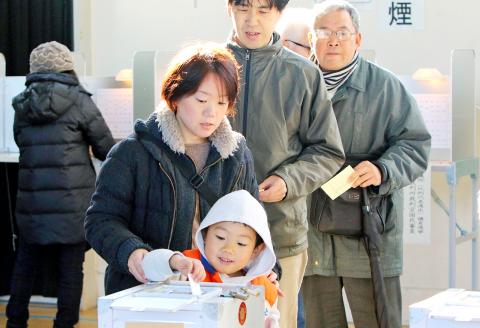Japanese Prime Minister Shinzo Abe won comfortable re-election yesterday in a snap poll he had billed as a referendum on his economic policies after early success faded into a recession.
However, a low turnout from unenthusiastic voters beset by heavy snowfall across much of the nation could cast doubt on the endorsement he will claim for “Abenomics” — his signature plan to resurrect the country’s flaccid economy.
Media exit polls shortly after voting finished showed his ruling Liberal Democratic Party of Japan (LDP) and its junior partner, Komeito, had swept the ballot, with an unassailable two-thirds majority in the lower house of parliament that will give them the power to override the upper house.

Photo: AFP
TV Asahi said the pairing had won 333 of the 475 seats, while TBS put the figure at 328.
The online version of the Nikkei Shimbun newspaper said the LDP alone had won between 290 and 310 seats, and was “on course to secure the two thirds [317 seats] in the chamber with coalition partner Komeito.”
“This victory will enhance Abe’s political capital and allow him to tackle tough issues more comfortably,” University of Niigata Prefecture politics professor Yoshinobu Yamamoto said.
Abe, 60, was only halfway through his four-year term when he called the vote last month.
Abe has been criticized for not being bold enough in taking on the vested interests that are the real key to reversing nearly two decades of economic underperformance.
His fresh four-year mandate may stiffen his resolve for economic reforms and see off opposition from within his ill-disciplined LDP, a party given to bouts of regicide.
However, with only 34.98 percent of voters casting ballots by 6pm, there might be questions over whether this really is an endorsement, or just the default reaction of an electorate numbed by a lack of viable alternatives.
The turnout at 6pm was down 6.79 points from the 2012 election.
However, early voting — which was completed by Saturday — was up by almost a tenth from the previous poll, to approximately 13 million ballots, according to the government.
Japanese Chief Cabinet Secretary Yoshihide Suga dismissed quibbles over the low turnout.
“We don’t know which party will benefit from a low turnout rate, so we think we received [a mandate from voters],” he told TBS.
“The prime minister feels very strongly about pulling Japan out of deflation and revitalizing the Japanese economy,” he said.
Voters polled in the run up to the ballot were uninspired by the choices on offer.
Only two-thirds of respondents told Kyodo News last week that they were interested in the election.
Many Japanese have been left bitterly disappointed by three years under the Democratic Party of Japan from 2009, which saw three emasculated prime ministers and a series of policy flops.

Intelligence agents have recorded 510,000 instances of “controversial information” being spread online by the Chinese Communist Party (CCP) so far this year, the National Security Bureau (NSB) said in a report yesterday, as it warned of artificial intelligence (AI) being employed to generate destabilizing misinformation. The bureau submitted a written report to the Legislative Yuan in preparation for National Security Bureau Director-General Tsai Ming-yen’s (蔡明彥) appearance before the Foreign Affairs and National Defense Committee today. The CCP has been using cognitive warfare to divide Taiwanese society by commenting on controversial issues such as Taiwan Semiconductor Manufacturing Co’s (TSMC, 台積電) investments in the

INVESTIGATION: The case is the latest instance of a DPP figure being implicated in an espionage network accused of allegedly leaking information to Chinese intelligence Democratic Progressive Party (DPP) member Ho Jen-chieh (何仁傑) was detained and held incommunicado yesterday on suspicion of spying for China during his tenure as assistant to then-minister of foreign affairs Joseph Wu (吳釗燮). The Taipei District Prosecutors’ Office said Ho was implicated during its investigation into alleged spying activities by former Presidential Office consultant Wu Shang-yu (吳尚雨). Prosecutors said there is reason to believe Ho breached the National Security Act (國家安全法) by leaking classified Ministry of Foreign Affairs information to Chinese intelligence. Following interrogation, prosecutors petitioned the Taipei District Court to detain Ho, citing concerns over potential collusion or tampering of evidence. The

‘COMPREHENSIVE PLAN’: Lin Chia-lung said that the government was ready to talk about a variety of issues, including investment in and purchases from the US The National Stabilization Fund (NSF) yesterday announced that it would step in to staunch stock market losses for the ninth time in the nation’s history. An NSF board meeting, originally scheduled for Monday next week, was moved to yesterday after stocks plummeted in the wake of US President Donald Trump’s announcement of 32 percent tariffs on Taiwan on Wednesday last week. Board members voted to support the stock market with the NT$500 billion (US$15.15 billion) fund, with injections of funds to begin as soon as today. The NSF in 2000 injected NT$120 billion to stabilize stocks, the most ever. The lowest amount it

NEGOTIATIONS: Taiwan has good relations with Washington and the outlook for the negotiations looks promising, Minister of Economic Affairs J.W. Kuo said Taiwan’s GDP growth this year is expected to decrease by 0.43 to 1.61 percentage points due to the effects of US tariffs, National Development Council (NDC) Minister Paul Liu (劉鏡清) said at a meeting of the legislature’s Economics Committee in Taipei yesterday, citing a preliminary estimate by a private research institution. Taiwan’s economy would be significantly affected by the 32 percent “reciprocal” tariffs slapped by the US, which took effect yesterday, Liu said, adding that GDP growth could fall below 3 percent and potentially even dip below 2 percent to 1.53 percent this year. The council has commissioned another institution